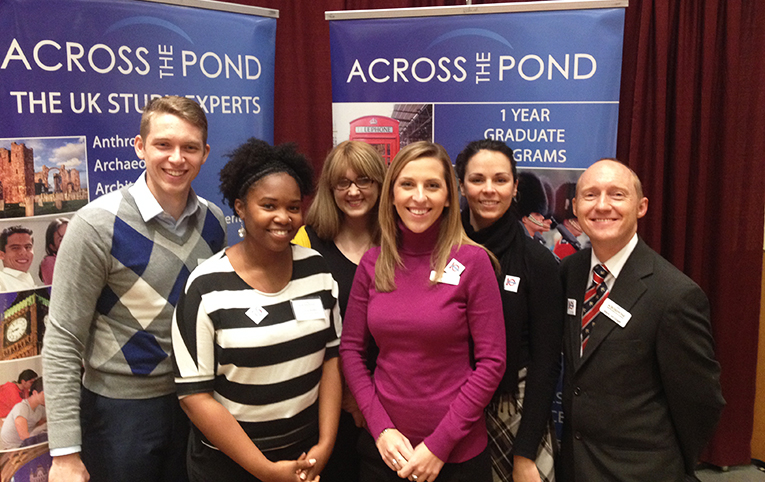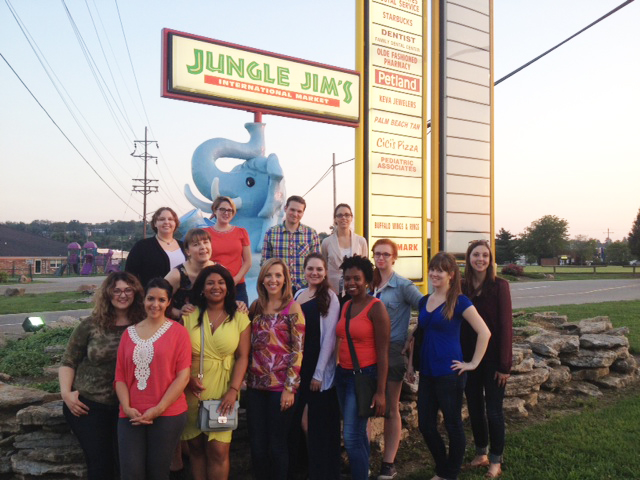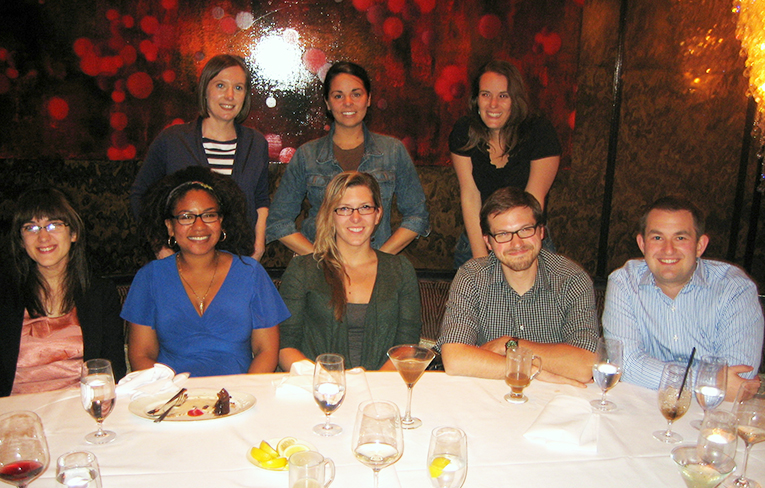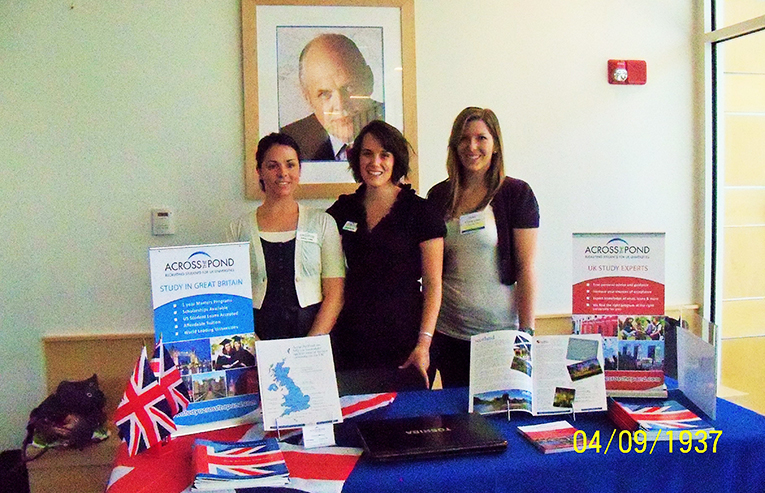Staff Interview with Ashley Griffith
Get to know Across the Pond's staff!

Ashley got her bachelor’s degree in English at Ohio University in 2005. After graduating, she became an elementary school teacher. In 2007, Ashley discovered Across the Pond, and by 2008, Ashley was a student at the University of Essex studying for her master’s in literature. time earning her degree in England was the best year of her life. In 2015, Ashley will celebrate six years of working for Across the Pond, a job which gives her the chance to help students follow the same dream she pursued seven years ago.
How did you first get connected to Across the Pond (ATP)?
In 2007, I called my alma mater, Ohio University, to ask them if they offered study abroad programs for students seeking their master’s degree in the UK. The person on the phone was actually an old friend from college, and she told me about Across the Pond, a company that helps students with the entire application process to UK universities specifically. Intrigued, I went to ATP’s website and signed up for a personal advisor. Within one day, I got an email from Hannah who offered to help me find the right university and program for my interests, for free! It was the easiest application process I had ever experienced, and before I knew it, I was in the UK getting my master’s! Dream come true.
Only later did I learn that Hannah was co-founder and managing director of ATP, and in 2007 the company was just three years old. I also learned that Hannah and John Borhaug, ATP’s other co-founder and CEO, were also students at Ohio University! In fact, they started Across the Pond while at OU, which may have been why my friend was aware the company existed and referred me to them directly.

Ashley with her team of advisors at a recruitment event in 2012
You have been with Across the Pond since 2010, in what ways have you seen the organization grow?
ATP has grown in every way imaginable. Just five short years ago, we were a small company of individuals who had to wear multiple hats. We did everything ourselves, from traveling to emailing students to inputting student applications to IT support to marketing to administrative work. I was a part of a three person team in the U.S., and we were testing our success in Canada and Latin America (by this time, the Norway branch was already fully established and profitable). The U.S. market was also only partnered with 17 UK universities.
Today, we’ve transitioned into a medium-sized company, we are established and profitable in all four of these countries, and we have over 40 university partners company-wide. We have over 60 employees that comprise a senior management team, HR department, marketing team, central administration team, an event coordinator, recruitment assistants, university liaison, and study abroad coordinator.
I feel very lucky to have joined Across the Pond on the ground floor, so to speak, and to be a part of its’ growth, and be one of its longest-standing employees today.
What has been your biggest accomplishment during your six years with Across the Pond?
Successfully moving into a management position and helping lead the company during these critical years of transition and growth has been a huge accomplishment, challenge, and reward in and of itself. As an English major, I do not have a background in business, so my role as U.S. manager has pushed me outside of a developed skill set into a skill set I didn’t know I had, but have loved exploring. Across the Pond has supported me in every way imaginable, with both training opportunities and a genuine belief that I can do the job in front of me.
Today, I have a “dream team” of student advisors who love helping students as much as I do. This current recruitment year is on track to be our best yet, so all of this has culminated into a feeling of success and accomplishment for me.

Ashley with her team in Cincinnati at Jungle Jim’s International Market in 2013
In your own experience with Across the Pond when you attended the University of Essex, what was the best part about going through Across the Pond versus going it alone?
At the point of applying to British universities, I didn’t know what a student visa was or that I could apply for FAFSA loans to pay for my studies. That’s hard for me to believe today! I’m pretty sure I wouldn’t have made it overseas without Hannah walking me through each step of the process. With the demands of teaching, it would have been put on the backburner forever. I think this is why I love advising students and have patience for their questions; I was in their shoes once! It’s a mindset I encourage my advisors to have every single day.
As someone who earned your degree abroad in the UK, what is some of the best advice you offer to aspiring UK international students?
Most students, while genuinely intrigued by the idea, are initially hesitant to seriously consider it; for some reason, many automatically close themselves to the opportunity. Over the years, I’ve investigated all of their reasons why and discovered that most students assume going to the UK for their education is really expensive. That is a very logical assumption, but it’s totally false! My first goal when talking to a student is to bust myths and share solid facts.
For example, U.S. students pay an arm and a leg for their education today; but did you know that in the UK, the most expensive graduate degree you can pursue (an MBA) in one of the most expensive cities in the world, London, is cheaper than the cheapest two-year graduate degree you can get in the U.S. on average? Often, it’s cheaper by up to $10,000! But no one realizes that. My job is to inform. Once the money barrier is removed, I can tackle other false assumptions, like accreditation, post-graduation employment, and nerves. It soon becomes difficult to find reasons not to go to the UK for your education!
That’s why I highly recommend all students attend our "Study in the UK: Reasons Why and How to Apply" webinar. I host this webinar personally and go into depth about these student concerns. It tends to relieve a lot of unnecessary worries and fears, for students and parents.
What do you feel the biggest benefit of international education is?
Three words: value for money. It is possible to spend a lot of money and not get a lot out of what your spending. The UK gives you the best bang for your buck.
My own story is a great example: I went to the University of Essex in Colchester, England. Essex is ranked in the top 35 universities in the UK, top 300 universities in the world, and has one of the most international campuses out of all of our partners. I rubbed shoulders with a ton of different nationalities. My dorm neighbors were from Norway, England, Germany, Japan, Ireland, Greece, Italy, and India. The discussion and debate I listened to and was a part of in and outside of the classroom was a huge part of my education.
Education is really all about exposure, and studying overseas provides you with that.
It's safe to say that year challenged and changed me completely. In addition to going to school, I got to do a lot of traveling. I traveled most of the UK, and went to Ireland and Italy. I was really smart with my money; I watched the budget, but I didn't skimp on a new experiences. I took out a $40,000 FAFSA loan and spent it all. This included tuition, living expenses, and accommodation.
Contrast that to if I stayed in the U.S. for my graduate degree and went to Ohio University. OU doesn't place in the world rankings. For my graduate degree at OU, I would have paid almost $80,000. So, for less money, I went to a better ranked university worldwide in the UK, traveled to five countries, and gained international exposure. I could not have done all of that as a grad student at OU for that price in that amount of time.

Ashley with her colleagues and senior management team, including Across the Pond’s CEOs, at dinner in Las Vegas in 2011
What does a typical day of work look like for you? What is your favorite part about your job?
Because ATP has been growing so quickly these last few years, I don’t have a typical work day right now! Every day presents a new challenge and a new opportunity. However, most days start with my new emails, answering anything urgent that may have popped up since the day before, and getting ready for any meetings I have that day or week. Most weeks or months have an overarching project or goal, so each day is geared toward completing those tasks. My main goal is being available to support my team of advisors so they can advise students as best they can.
My favorite part of my job is my work colleagues. We all have very different lives, backgrounds, and upbringings, but our UK education and passion for helping students brings us together. We are probably the most interesting group of people you will ever encounter!
What part of British culture has stuck with you from your time abroad?
Their culture of rest and reprieve. The British, and all of Europe really, aren’t as obsessed with work as we Americans can be. Because American culture is “work, work, work”, it’s very easy to get sucked in and live a stressed, rushed, frantic life here. When I was in the UK, it struck me how relaxed everyone was about everything. I promised myself not to became a stressed out American again (hasn’t worked that well, honestly!).
For example, during the summer when I was writing my dissertation, my Greek neighbor invited me to lunch. I thought, Sure, I have time to take a 30 to 40 minute lunch, and then dive right back into my research. Lunch took three and a half hours! My Greek friends were in no hurry whatsoever. I had to mentally tell myself that my dissertation would be there waiting for me when I got back, but this time with relaxing with friends is irreplaceable. I learned to be in the moment and more people-focused that afternoon.
You were a Primary School Teacher for almost four years before you began working for Across the Pond. How does your experience as a teacher help you in your current role?
Amazingly, the skills I developed as a teacher come into play at ATP every day. I’m still dealing with students so that is very familiar territory. I’ve played a large role in training new employees that join ATP, so my skill at teaching and sharing new knowledge in an understandable way comes into play. This teaching experience also comes into play with the webinars I host; even though it’s virtual, I still feel like I’m at the front of a classroom teaching a lesson (I love it!).
Teaching requires a lot of patience, forward planning, project management, time management, people and leadership skills, and multitasking. I’ve had to tap into all of those skills as an employee at ATP.

Ashley at her very first recruitment event as an Across the Pond student advisor in October 2010
As manager of Across the Pond’s U.S. office, what goals do you have for your team for the remainder of 2015?
Across the Pond has undergone an extensive series of changes and upgrades in the last year. My main goal is to navigate these changes as smoothly as possible, being available for my advisors as much as possible, so we can take the best care of our students and go into 2016 ready to hit the ground running into our best year yet. When a group of people go through something together, be it challenging or exciting, that shared experience brings them closer together. I hope we end 2015 and look forward to 2016 as a closer knit ATP family with a shared passion and commitment to make ATP better than ever and our message as widely broadcasted as possible!

